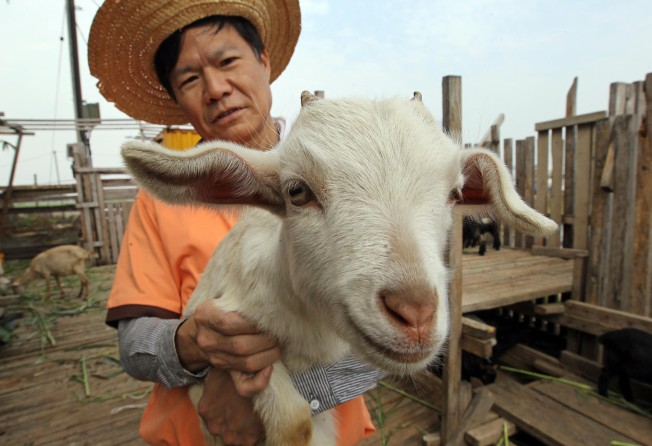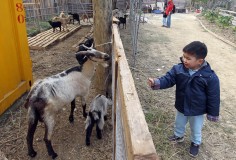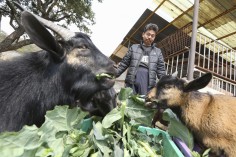Hong Kong's goat keepers ready to help the city ring in the year of the goat

The year of the goat promises to usher in a busy time for Hong Kong's goat keepers. Allan Shek Kwok-keung is counting on it. Last week, the Yuen Long native opened his Little Goat Lemon Garden to the public, and he hopes to receive a stream of visitors as the Lunar New Year brings greater interest in the animal.
Occupying a 40,000 sq ft site near Mai Po, the leisure centre includes a big fish pond, the citrus trees that it is named after and, of course, a herd of goats.
Other than pigs, livestock don't seem to have a major presence in Hong Kong, but there are, in fact, 15 farms in the city that keep goats, according to Agriculture, Fisheries and Conservation Department records.
Shek's is the latest entrant.
An indigenous villager, he used to raise pigs and poultry on his own land in Yuen Long, but turned to goats as tighter restrictions on livestock farming made operations more difficult.
Starting with just three dairy goats seven years ago, his herd has grown to 100.
Keeping goats, Shek says, has proved to be much easier than other livestock.
"You don't need a licence. I just have to inform the conservation department that I am keeping goats, and they will send staff to inspect the area and make sure it is spacious enough for goats to move around and that they have access to clean water."
The authorities regard the goats as pets, perhaps because they have rarely figured in farm operations in the past.
Still, establishing the sprawling site that now accommodates Shek's herd took a while.
"I spent a lot of time liaising with villagers before securing this space, including the fish pond," he says. Shek is only required to pay nominal rent to the owners, who are happy to have someone help look after their land. It cost him HK$500,000 to set up the facility, constructing the stalls and wooden fencing himself over the course of a year with the help of some volunteers.
A watch salesman by day, Shek says his goat-keeping sideline is more for personal interest than for generating extra income.
"I need the job as a means of livelihood, and selling watches allows me to work flexible hours. But I spend half my waking hours with the goats."
Goats cannot be kept confined to a pen all day; adult goats need to wander about and to forage every day. Penned-in goats have poor health and weak legs, Shek says. "On their daily stroll, the alpha buck will lead the herd out of the park in the afternoon and come back before dusk. But I or my volunteers need to act as herdsmen and take along bamboo sticks to scare off stray dogs or wild boars and scythes to clear paths through thick brush so that the goats can reach grassy patches."
Goats will tug and chew on almost anything, so it's fortunate his new park is a long way from any farm or home and is unlikely to become a nuisance.
"In the past, I kept the goats in my village in Yuen Long. When I took them out for a ramble, the goats would munch on whatever plants they came across, including papaya trees. I wound up having to compensate other villagers for their losses."
Then Shek discovered there was one thing that goats didn't like to nibble on - lemon trees - so he decided they would make a suitable fruit crop for his park.
During winter, when the vegetation thins out, Shek must take his herd farther afield to find suitable grazing, sometimes walking more than three hours. In between, there are the chores of turning their dung into compost for the orchard and repairing the wooden fencing.
Still, Shek says he loves spending time with the goats.
"I've loved animals since I was a child, and was very sad when the Lai Chi Kok Zoo closed [in 1993] because there was no other place to see lions and elephants. A visit to Ocean Park cost several hundred dollars, so children who don't have much money can only read about animals from books. So I decided to set up an educational park."
Visitors to his centre - he expects to see young families, school groups and the like - will be able to feed the goats and learn more about them.
Dubbing himself "Goat Daddy", he says the animals are easy to keep.

"You don't even have to buy animal food as they can eat weeds and all kinds of grasses. I even give them carrots and bread."
He adds that goats don't get ill easily, and he hasn't had to take any of them to a vet yet.
Goats, which can live up to 15 years, are docile animals that can show strong emotions, Shek says, recalling the reactions of a mother goat after the herd returned from a daily ramble and discovered that her kid was missing.
"The mother goat was wailing all night. When I took her back to the hills the next day, she bleated along the way, calling to her baby."
It turned out the baby goat had been trapped in a gully, and when Shek made the rescue, the mother goat was visibly elated.

At the Fuqin Pitaya Organic Farm in Sheung Shui district, owner Lum Choi-kam shares a similar passion for the ruminants. He has 22 goats (along with a cow and some rabbits) as part of the small menagerie he has built up for visitors to his 1.8 hectare farm in Kwu Tung. But maintaining the herd was never part of his plan.
When Lum first bought three Dongshan goats in 2005 after surrendering his licence for keeping pigs and poultry, the intention was to raise them for meat.
"My wife and I eventually dropped the idea when we discovered what an adorable character they had," he says. "They love to play all the time and like to clamber up to high places."
Although the goats are housed in a wooden stall, Lum leaves the goats to graze in the surrounding hills.
"They are free to roam around. Every day, the herd leaves their enclosure around noon and returns before dusk."
Lum says at one point he had more than 40 goats, but half of them have disappeared over the years. "I don't know what happened to them," Lum says, although he suspects they might have been caught in traps set out for wild boars.
Thankfully, the situation has improved. "We lost only one goat over the past six months. Our farm is also quite remote and there is no other farming activity around here, so there's no worry about the goats being poisoned after grazing on pesticide-coated vegetation."
Still, Lum and his goats face an uncertain future. On top of the annual rent for the site having tripled to HK$120,000 two years ago, they are only given a short-term lease, and Lum suspects the land will be sold eventually.
"We don't know how long we can carry on farming here."
It will be difficult to secure a similarly sized piece of agricultural land, he says, "but no matter what happens in the future, we will try our best to make sure the goats are well cared for".
Like Shek, he is preparing for a festive rush over the Lunar New Year; the farm is collaborating with a mall in Tsing Yi to give shoppers the chance to get close to the goats at his organic farm.
It's a spike in visitors that occurs only when the 12-year cycle of the Chinese zodiac turns to the goat, Lum concedes. "But I am happy that more people will know about how wonderful the goat is as an animal. I hope more people will see them as more than just a source of food."